The internet bombards you with third-party professional security system reviews, each claiming unmatched authority and praising specific companies. But beneath the marketing blitz, a crucial question remains: what exactly is a professional security system, and why does it carry a higher price tag compared to DIY options?
This article dives deep into the world of professional security systems, offering a wireless intrusion alarm manufacturer‘s perspective–from the intricacies of production to the final sale. Whether you’re an alarm system distributor, a system integrator, or a homeowner considering security options, we hope this article will assist you in making informed decisions.
What is a Professional Security System?
A professional security system goes beyond basic alarms. It’s a meticulously designed security solution that safeguards people, property, and critical information. Here’s a breakdown of its key components:
- Front-line Defense: This includes cameras, sensors, and alarms strategically placed to monitor your premises in real-time and collect crucial data.
- Fast and Secure Data Transmission: Control panels or home security hubs ensure swift and reliable transmission of data.
- Backend systems: The data is received, processed, and stored in secure backend systems.
- 24/7 Vigilance: Dedicated control centers staffed by trained professionals monitor activity around the clock and handle alerts promptly.
By leveraging advanced hardware and software technologies—such as the Internet of Things, big data analysis, and artificial intelligence—along with customized designs (e.g., backup power systems, network redundancy design, frequency hopping spread spectrum, secure encryption for communication systems, and arm away delay adjustments for various security scenarios), these layers of protection work in concert to deliver real-time monitoring, precise alarm handling, and in-depth data analysis.
With such design, professional security system provides faster response times in emergencies, valuable insights for future security improvements, and ultimately, a more secure environment. Such systems not only elevate overall security efficiency but also improve the ability to prevent potential risks and manage emergencies effectively.
Key Players of Professional Security Alarm Industry
To understand the complexity and high cost of professional security systems, it’s essential to recognize the various roles within this value chain. There are three main groups in the overall system architecture:
Security Device Manufacturers
Specialized equipment production companies, like Roombanker, provide complete design-to-manufacture wireless security alarm solutions from front-end devices to backend systems. This includes hardware such as cameras, PIR motion sensors, alarm sirens, and access control devices, as well as software like cloud servers and home security system app apps.
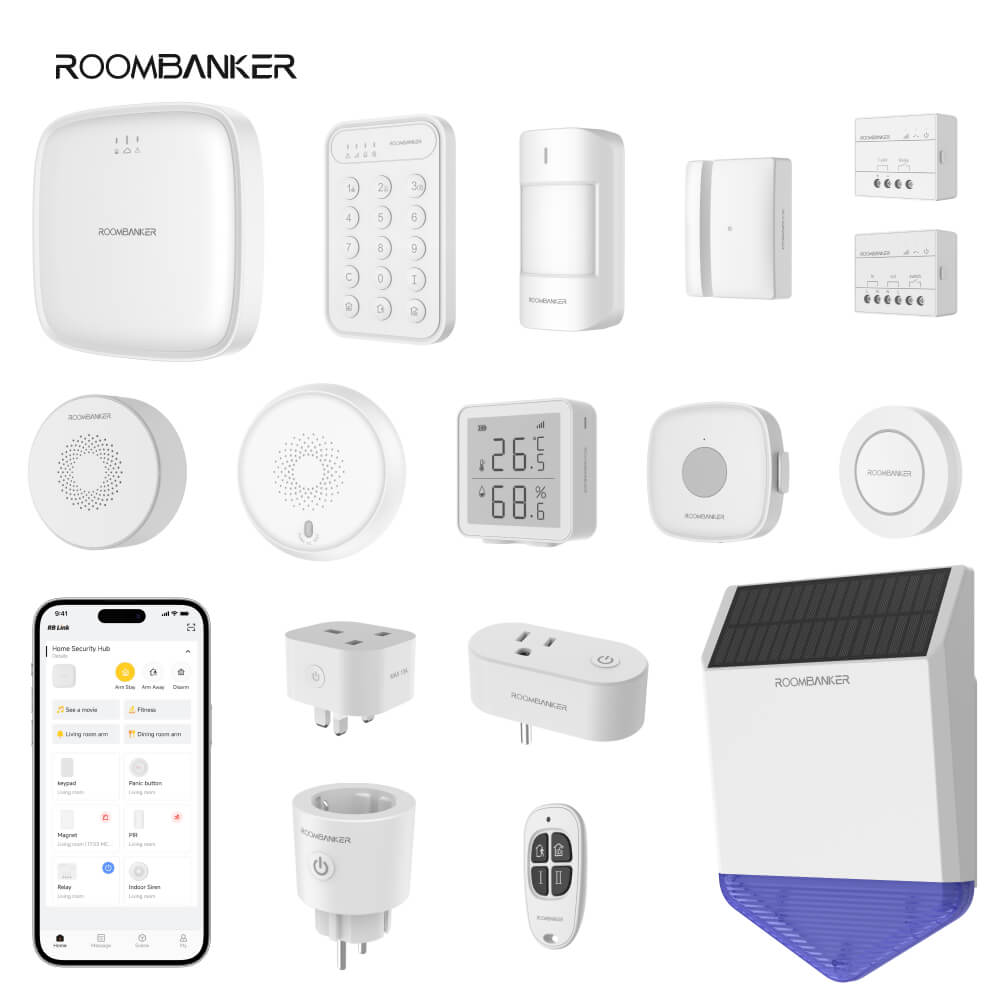
These manufacturers have experienced product management teams with years of security industry expertise, product design, and sales backgrounds. They understand market needs and translate them into innovative product strategies. The hardware team meticulously designs and manufactures high-quality components to ensure product reliability and stability under various conditions, while the software team focuses on creating advanced security software with intelligent detection algorithms, user-friendly interfaces, and remote access capabilities. Together, these teams deliver exceptional products and solutions to users.
System Integrators and Installers
Two other crucial roles in the professional security system industry are system integrators and installers:
System Integrators
Typically serving enterprise-level customers with one-off project requirements, system integrators design and plan systems based on customer needs, select appropriate equipment, and integrate the system to ensure seamless collaboration and efficient operation. They possess extensive technical knowledge and market insights, provide customized intrusion alarm solutions, and conduct comprehensive system testing and debugging to complete project delivery.
Installers
Serving both enterprise and individual buyers, installers handle on-site equipment installation and debugging, ensuring correct deployment and stable operation. They understand the working principles and installation requirements of the equipment, perform necessary on-site construction and configuration, and offer ongoing maintenance and support to ensure continuous system effectiveness and reliability.
Alarm Receiving Center (ARC)/Central Monitoring Stations (CMS)
The ARC/CMS is responsible for 24/7 real-time monitoring of all connected security system devices. It receives and processes alarm signals from front-end devices, such as cameras, sensors, and alarms. Upon receiving an alarm signal, ARC operators immediately verify the alarm, confirm the incident’s authenticity, and effectively prevent false alarms. Once confirmed, the ARC promptly notifies relevant emergency services, such as the police, fire department, or security personnel, ensuring timely response and handling of the situation.
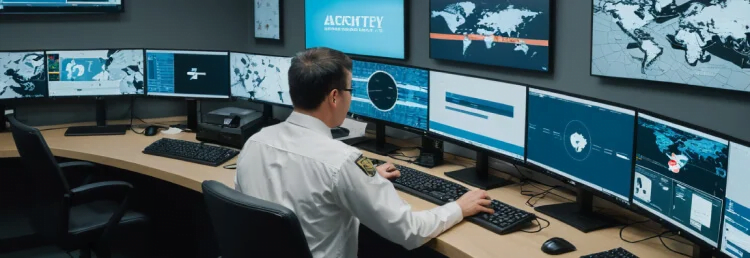
Additionally, the ARC maintains communication with end user customers, informing them of incident details and measures taken, and provides professional advice and support. To ensure traceability, the ARC meticulously records all alarm events and handling processes, offering important data support for subsequent analysis and system improvements. Through these functions, the ARC plays a crucial role in ensuring quick and effective handling of security incidents, safeguarding the safety of personnel and property.
Also read: what is a security alarm system?
Distributors
Distributors are essential intermediaries between manufacturers and end-users. They play a crucial role in the distribution and sales of security alarm systems and components. Alarm system distributors can be divided in to national distributors, regional distributors, and various local distributors.
National distributors are large-scale companies with a broad reach, often operating across multiple regions. They typically handle a wide range of security products and have established distribution networks.
Regional distributors focus on specific geographic areas within a country. They often have deeper relationships with local installers and dealers.
Local distributors are smaller distributors with a focus on a particular region or city. They may specialize in specific product categories or serve a niche market.
These distributors source security products from manufacturers or importers, maintains stock levels to meet customer demand, promote products to installers, dealers, and end-users, and manage product delivery and transportation. They also provide technical assistance to customers.
FAQs of Professional Security Alarm System
What are the Benefits of Connecting to an ARC or CMS?
Professional security systems often offer the option to connect to an Alarm Receiving Center. While app notifications can be helpful, people cannot always be glued to their phones to receive app notifications—they might be on vacation, sleeping, or fully engaged in a meeting.
In such situations, if burglars enter the home, homeowners may not promptly detect the app notifications. Having third-party ARC monitoring can ensure a timely response and prevent further escalation, providing a vital layer of security.
Is Connecting to an ARC/CMS Mandatory?
Connecting to an ARC center depends on your security needs and budget. Accessing an ARC center typically comes with a monthly or annual fee, and may also involve initial installation costs, making it a relatively expensive option.
Many self-monitored home security systems are available on the market. Roombanker currently offers a self-monitored solution but will soon introduce an ARC integration option, which could be a more cost-effective home security choice.
How Do Security Systems Connect to an ARC/CMS?
Smart security alarm systems can connect to an ARC or CMS through three primary methods:
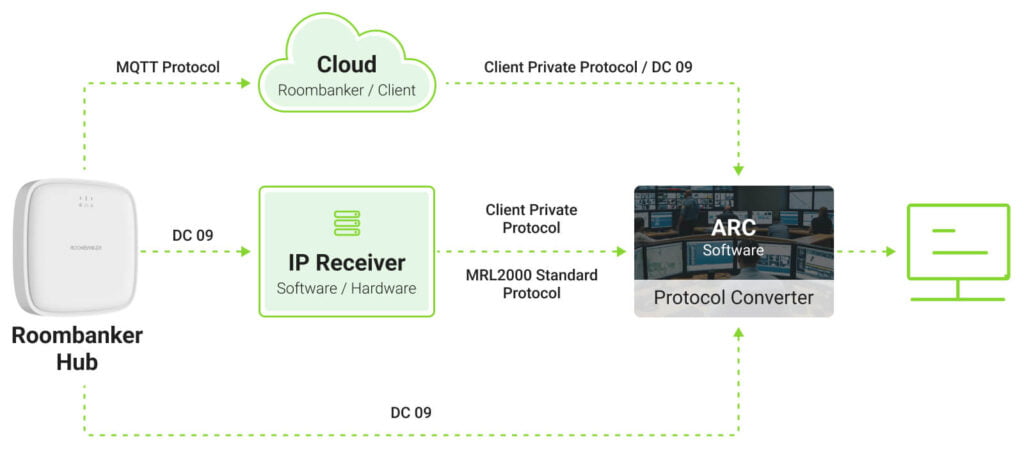
Cloud-Based Transmission:
The home security hub sends data in the MQTT format to the manufacturer’s cloud server. The server then converts this information into the ARC’s proprietary DC 09 protocol before forwarding it to the ARC platform.
The smart hub sends the data information directly in the DC 09 format to an IP Receiver. The IP Receiver then translates the information into the ARC’s proprietary protocol or the MRL2000 standard protocol and sends it to the ARC platform.
Direct Transmission to IP Receiver and Protocol Conversion
The home security hub sends data in the DC 09 format directly to an IP Receiver. This IP Receiver acts as an intermediary, converting the DC-09 format into either the ARC’s specific protocol or the MRL2000 standard protocol. The converted data is then sent to the ARC platform for action.
Direct Protocol Conversion:
The home security hub sends data in the DC 09 format directly to the ARC’s Protocol Converter. The Protocol Converter translates the protocol and sends the information directly to the ARC platform. This dedicated device translates the data into the ARC’s internal language and sends it directly to the ARC platform for immediate monitoring.
These methods ensure that alarm and event data are reliably and securely transmitted to the ARC for effective monitoring and response, safeguarding the protected premises.
When you purchase professional security products and services, the corresponding ARC center will provide you with account names, IP addresses, ports, and other necessary information. Once you configure these details in the corresponding app, your security system can be monitored and managed by the ARC center’s professionals. In the event of an emergency or security breach, they can quickly respond and take appropriate actions.
Necessary Features That A Professional Security System Must have
While basic alarms offer a layer of security, professional security systems go a step further. They incorporate advanced features to create a comprehensive shield for your home or business. Let’s explore the features that elevate them from basic systems to trusted protectors.
Multiple Network Redundancy
Relying on a single network connection method for a smart home hub or control panel can be unreliable. For example, a power outage at home could render Wi-Fi unusable, an Ethernet fault could disrupt the connection, or a SIM card could run out of balance or suffer from service provider issues. Any of these scenarios could prevent alarm information from being quickly and accurately delivered to the user and security company.
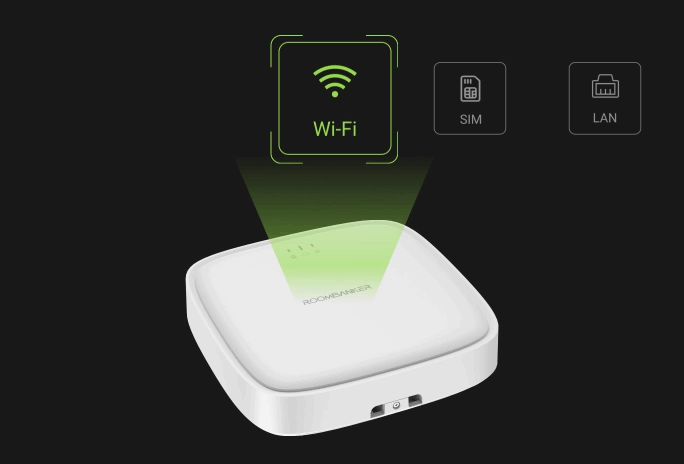
Roombanker smart home security hub supports three parallel network connection methods. If one communication line fails, it immediately switches to another and sends the fault information to the user, ensuring the system’s operational stability.
Backup Power Design
Power outages happen. When they do, a robust security system shouldn’t falter. Hardware devices, especially hub or control panel of professional security system should be equipped with long-lasting backup batteries.
Roombanker home security hub is equipped with a 2500mAh backup Li-battery, providing up to 8 hours of stable power, effectively ensuring the home security system’s normal operation during a power outage.
Stable Cloud Services
As the data brain of the entire system, the security and stability of cloud services are paramount. Cloud services manage communication and relay data between the home security hub (base station), security companies, and user interaction apps, ensuring the system’s stable operation.
Roombanker has cloud service deployments in Europe, the Americas, and Asia, ensuring global users can use the smart security system efficiently, conveniently, and stably.
Secure and Efficient Wireless Communication
In a wireless security system, various detectors, sensors and control devices transmit data to the home security hub using radio technology. To ensure utmost security, communication must be very stable, with even brief disconnections being unacceptable.
Wireless communication can utilize multi-frequency FHSS technology for quick switching to other frequencies in case of interference, avoiding fixed frequency. Additionally, encryption of wireless data transmission is essential to prevent data interception.
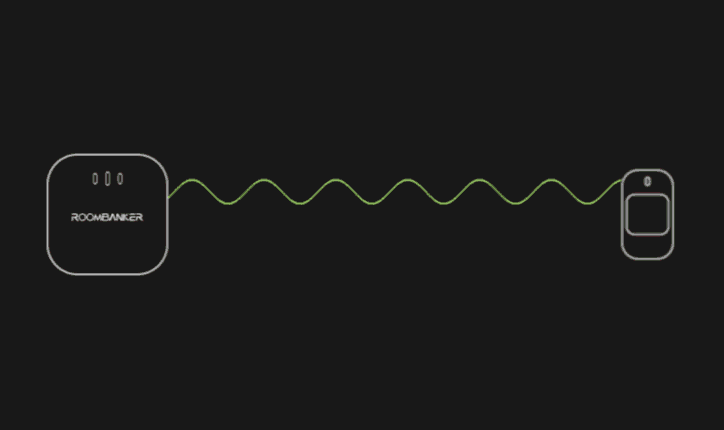
Roombanker’s self-developed RBF protocol boasts three major features: ultra-long communication range, ultra-low power consumption, and ultra-high security. It supports dual frequency bands of 868MHz and 915MHz, with a maximum two-way communication distance of up to 3500m in a quiet, interference-free environment. It incorporates TDMA (Time Division Multiple Access) and FHSS (Frequency-Hopping Spread Spectrum) technology, ensuring data transmission stability. Additionally, the RBF protocol uses a 128-bit AES encryption algorithm, making it extremely difficult for hackers to crack, thus ensuring information security.
Also read: Why wireless security alarm devices prefer proprietary protocols?
What Scenarios Are Professional Security Systems Suitable For?
Professional security systems aren’t a one-size-fits-all solution. They excel in scenarios demanding robust protection, here are some prime examples:
- Large Commercial Buildings and Shopping Malls: These areas have high pedestrian traffic and numerous valuable items, requiring comprehensive video surveillance and entrance control systems to ensure security.
- Banks and Financial Institutions: With large amounts of cash and sensitive information, these locations need stringent security measures, including facial recognition and fingerprint access control technologies.
- Government Agencies, Military Units, and Other Important Sites: Considering national security, the security needs of these sites are very high, requiring advanced and reliable systems.
- Airports, Train Stations, and Other Transportation Hubs: Due to the large flow of people, comprehensive video surveillance and intrusion detection are necessary.
- Factories, Warehouses, and Other Production Sites: To prevent property losses and ensure personnel safety, these sites require robust security systems.
- Residential Properties: Home scenarios like apartments, houses and villas, and more also need professional security systems. These places are where people spend their most time and our loved ones live in, and need utmost security to make sure everyone enjoy peace of mind.
Can I Install a Home Security System by Myself?
The previous sections explored what is a professional security alarm system, key players, and advanced feature a professional security alarm system must have. Security is paramount, and a professionally installed system offers the ultimate peace of mind. However, for those seeking a more budget-friendly option, advancements in technology have opened doors to DIY security systems.
The past two decades have seen a surge in wireless technology. This eliminates the need for complex wiring, making installation easier and often more budget-friendly, especially compared to wired counterparts. Here comes Roombanker.
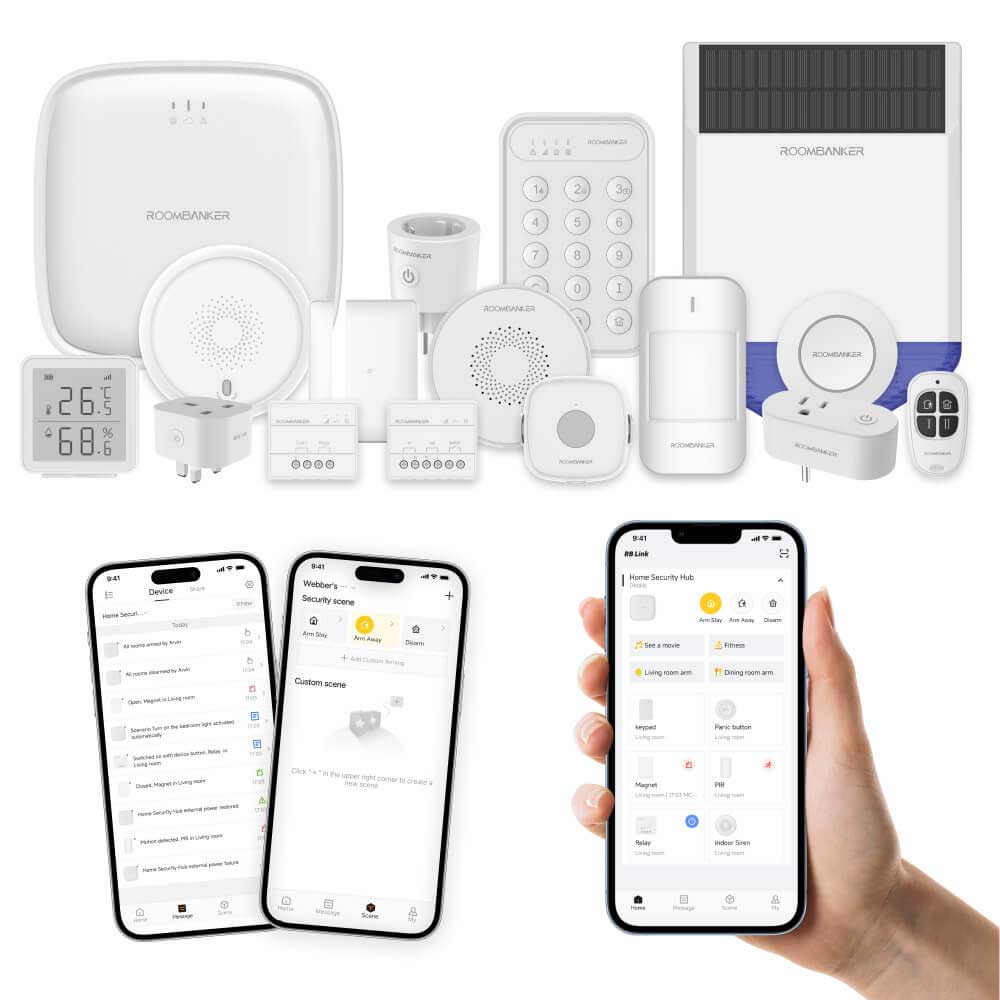
Our system allows users to install the equipment themselves, incorporating various user-friendly installation designs. The devices support signal strength detection, enabling users to conveniently check if the current location is suitable for best signal quality and choose the optimal placement for each component. Additionally, most devices can be directly installed using adhesive backing, making the process simple and convenient. After installation, users can perform functionality tests through the app to ensure the devices are working properly.
Also read: How does Roombanker system add bulk devices in seconds?
Roombanker: Recruiting Global Distribution Partners
Throughout this exploration of professional security systems, i believe that you’ve gained valuable insights into their capabilities, complexities, and costs.
As a manufacturer of intrusion alarm devices, Roombanker is committed to providing a complete lineup of high-quality security solutions for diverse scenarios. Our wireless security products, such as PIR motion sensors, use multiple methods to enhance precision detection.
We offer a complete lineup of detectors, alarm keypads, keyfobs, indoor and outdoor alarm sirens, and many other automation devices, all utilizing our proprietary secure wireless communication protocol to ensure system stability and data encryption.
We sincerely invite alarm system distributors from around the world to explore business opportunities with us and work together to create a safe and intelligent future. If you have any questions or are interested in cooperation, please feel free to contact us at any time.
